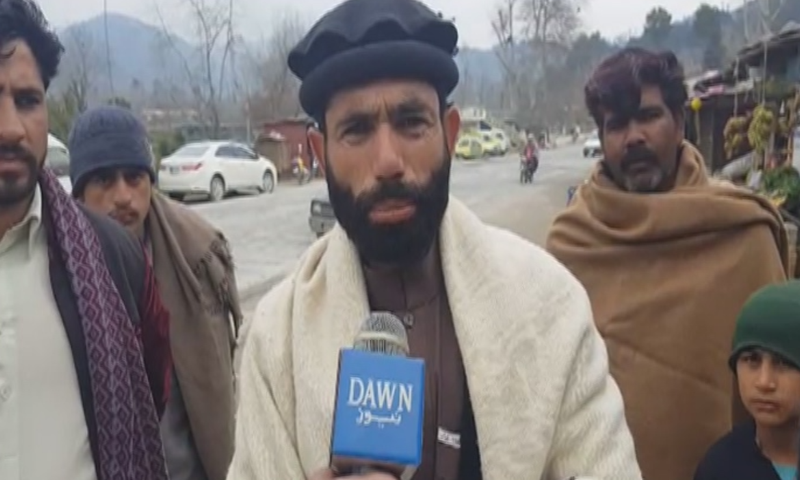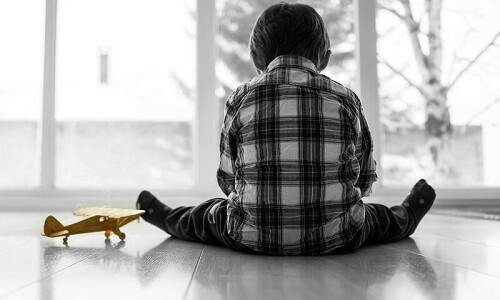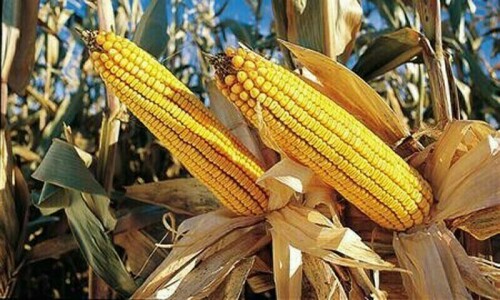MANSEHRA: Villagers in Jabba were woken up by successive explosions in the early hours of Tuesday morning when Indian aircraft reportedly dropped bombs on a hill overlooking their small hamlet, thirty kilometres to the north-east of Balakot city that was devastated by a huge earthquake in 2005.
“We were woken up by five big explosions,” said a local resident, followed by sounds of the aircraft in the distance, he added. The bombs hit downward slopes of the hill dotted with green fields and surrounded by pine trees, creating a big crater, he said.
Another described what happened during a visit to Jabba in Balakot tehsil of Khyber Pakhtunkhwa.
“After the first explosion I ran out of the room to ascertain as to what had happened. I saw a beam of light and rushed back to my room when my mother called out to me. I heard three other big bangs in succession. It was a horrible sound, I cannot explain to you,” said Mohammad Zakir.
A nearly 10-foot-deep depression appeared in front of his house without damaging his residence.
Chaudhry Shafqat Awais, 28, said initially he thought an earthquake had struck them, reminiscent of the 2005 one that had laid waste to Balakot and Muzaffarabad.
“The loud bangs literally shook our houses and then there were sounds of the aircraft. I visited the site at about 10am and saw four craters at two different places,” he said showing visuals of the craters he had captured from his cellphone.
The visuals showed crust of greyish gravel and some fallen pine trees in and around the craters.
Ammunition fragments, trees on fire
Several other villagers also shared their eyewitness account of the area. Some had brought the fragments of the ammunition.
Others saw trees on fire. “There are just some burnt trees and nothing else,” said Zahid Hussain Shah. “Some trees appeared to be on fire,” another witness said.
Some locals from the village, known for sheep breeding traditions, said they saw Pakistan Airforce jets hovering overhead.
Overlooking the area of the air strike stood a single-storey mud house and no other structure nearby, lending credence to view that the Indian planes “dropped their payload” while escaping.
The area was later cordoned off by the military to check for any unexploded ordnance.
No ambulance seen
The lone injury case reported was that of a 60-something Nooran Shah, whose nearby mud house door was ripped from a wall by the impact of the explosion which hit him in the head. He was discharged from a local hospital after first aid was administered to him.
Local residents said they did not see any ambulances or any evacuation soon after the bombing that could lend credence to India’s claim of having targeted a militant training camp or killing several hundred of them.
“There has been no such activity here, no camp, no militant, nothing,” said Shaukat Qureshi, a local resident. “This is total rubbish,” he added.
Dr Mohammad Javed Tanoli, Medical Superintendent of the King Shah Abdullah Teaching Hospital, the only tertiary care hospital in the district, said no casualty was brought from the scene of the bombing, except for the lone wounded man.
“There would have been chaos here, had there been casualties of the scale the Indians are claiming,” Dr Tanoli said. “This is like any other day, routine work and nothing else. No wounded person from the strike area was brought here and the government did not issue any [emergency] alert,” the medical superintendent added.
A cab driver, Mohammad Jibran, who regularly takes passengers to Balakot city and the district headquarters, said he returned to his work on Tuesday morning and found no unusual activity, except that local residents spoke of an early morning air strike on the hill.
The traffic on Mansehra-Naran-Jalkhad road which passes through Jabba remained normal and the local bazaar with nearly 50 shops was also busy and bustling.
Muhammad Safeer, a hotelier along this road, said his eatery remained open from Fajr till midnight. “I did not see a single ambulance running through this road. If any deaths had occurred here, as claimed by the Indian government, they would have been evacuated through the same route,” he said.
Tariq Naqqash in Jabba also contributed to this report.
Published in Dawn, February 27th, 2019














































